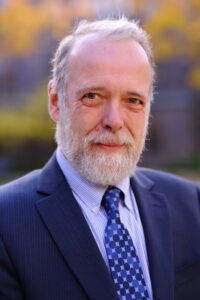Five Questions With… Dean Michael Ratcliffe
Michael Ratcliffe is Trinity’s Dean of Arts and Vice-Provost, and a professor in the Department of Immunology at U of T. We spent a few minutes chatting about pandemic learnings, what has students buzzing, and what’s on the horizon for the College.
1. This fall is the first time since fall 2019 that most of the Trinity community can be on campus together again. What have been the highlights so far for you?
MR: Returning to in-person classes after the restrictions of the past few years feels wonderful. There’s a general lightening of the atmosphere on campus. I notice it especially with our first-year students, who spent the last two years of their high school experience almost entirely online. They are so happy to be learning in person—and it is so great to teach when the class is excited to be there.
2. Your popular first-year course, The Art of Scientific Discovery, is part of the Margaret MacMillan Trinity One program. How has the course been shaped over the past few semesters by the events of the pandemic?
MR: The COVID pandemic has validated many of the ideas we touch on in the course. COVID vaccines, for example, provided an accelerated real-time example of the scientific discovery process. The Chinese were the first to discover the sequence of the virus, and they then made that sequence available to the entire scientific community, which lead to the development of the new vaccines. It’s a great example of the importance of collaboration and communication in the scientific discovery process. No single lab can succeed alone—it’s important to share our learnings and publish them transparently to further our collective understanding.
3. In 2016, you spoke with Trinity magazine about plagues and immunology, and offered your thoughts on the inevitability of the next “big one.” That was roughly four years before the World Health Organization declared the COVID-19 viral disease a pandemic. What have we learned from COVID that would change or update your perspective on plagues?
MR: When I look back on my pre-pandemic predictions, it’s remarkable how nearly every one of them played out. It’s all quite predictable from a scientific perspective, as is the fact that there will be other plagues in our future.
There’s still a lot we don’t understand, especially about long COVID, and whether there are genetic elements in play. But we built on what we had learned from the SARS pandemic, and we will continue to learn from COVID. We’ve also learned that we need vaccine production capacity in Canada. If we had had the ability to manufacture our own COVID vaccines we would have been faster in terms of their rollout across the country.
As a society, I think we are more prepared to mask when we’re in groups or on transit now. This has been an accepted practice in China and Japan for many years, and I believe we are also adopting that culture of consideration for others in North America—masking if you have symptoms, staying home when you’re sick. At Trinity, a silver lining of the pandemic has been greater flexibility. For example, I was sick with a cold a couple of weeks ago. I felt up to teaching for the two hours but didn’t want to expose anyone else to my cold, so I was able to switch to a Zoom class with 24 hours’ notice, and every single student showed up for our online class. Pre-COVID we would have had to cancel and make that class up later.
4. Can you share your thoughts on how you have seen the College become a more welcoming and inclusive community for everyone?
MR: At Trinity, we are working to create new traditions and events that focus on celebrating our College’s diversity, which is one of our core strengths.
I have also found the equity, diversity and inclusion workshops for faculty and staff very helpful in underlining that everything we do comes from our own perspective, cultural background and privilege. That realization is fundamental to thinking about how our actions are perceived from others’ perspectives.
We are also examining the academic programs we offer at Trinity. Given the nature of our programs, in particular the International Relations and Ethics, Society and Law Programs, issues of equity, diversity and inclusion are critically important in the way we examine these subjects.
5. The Trinity campus is about to look different, as construction preparations begin for the new Lawson Centre for Sustainability. You have been a vocal advocate for the Living Trinity Campaign—what excites you most about this next chapter for the College?
MR: There’s definitely a buzz in the air as we get closer to breaking ground for the Lawson Centre for Sustainability. Students get excited, even if they won’t be on campus when it’s done—they appreciate that Trinity is looking to future generations as well.
The new building will increase the number of students who can live in residence on the Trinity campus and give us more space for our academic programs. At Trinity, we are limited not by our ideas but by our resources—and the Integrated Sustainability Initiative, made possible through the Lawsons’ generosity, is an example of a truly extraordinary initiative happening right now.
Bonus question: What are you reading?
MR: At the moment, I’m working through a scientific manuscript. Peer review is an important part of the scientific process, and it’s something I try to contribute to regularly. Beyond that I have always enjoyed the novels of John Le Carré; he writes so elegantly. When I finished his final novel, Silverview, it felt like saying goodbye to an old friend.


Sorry, comments are closed for this post.